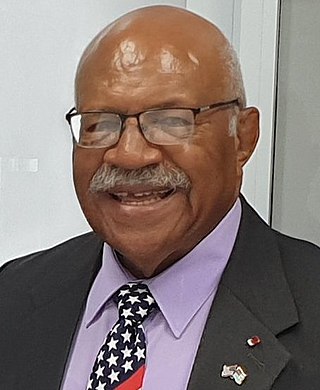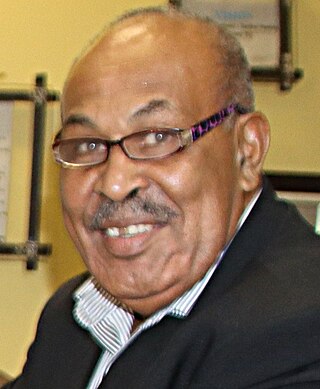Related Research Articles

Mahendra Pal Chaudhry is a Fijian politician and the leader of the Fiji Labour Party. Following a historic election in which he defeated the long-time former leader, Sitiveni Rabuka, the former trade union leader became Fiji's first Indo-Fijian Prime Minister on 19 May 1999, but exactly one year later, on 19 May 2000 he and most of his Cabinet were taken hostage by coup leader George Speight, in the Fiji coup of 2000. Unable to exercise his duties, he and his ministers were sacked by President Ratu Sir Kamisese Mara on 27 May; Mara intended to assume emergency powers himself but was himself deposed by the military leader, Commodore Frank Bainimarama.

Laisenia Qarase was a Fijian politician. He served as the sixth Prime Minister of Fiji from 2000 to 2006. After the military quashed the coup that led to the removal of Mahendra Chaudhry, Qarase joined the Interim Military Government as a financial adviser on 9 June 2000, until his appointment as Prime Minister on 4 July. He won two parliamentary elections, but a military coup removed him from power on 5 December 2006. He was later imprisoned on corruption charges brought by the military-backed regime.

The United Fiji Party was a political party in Fiji. It was founded in 2001 by Prime Minister Laisenia Qarase as a power base; it absorbed most of the Christian Democratic Alliance and other conservative groups, and its endorsement by the Great Council of Chiefs (Bose Levu Vakaturaga) caused it to be widely seen as the successor to the Alliance Party, the former ruling party that had dominated Fijian politics from the 1960s to the 1980s. It drew its support mainly from indigenous Fijiians.

Sitiveni Ligamamada Rabuka is a Fijian politician, former soldier and former sportsman who has served as Prime Minister of Fiji since 24 December 2022. He was the instigator of two military coups in 1987. He was democratically elected as Prime Minister of Fiji, serving from 1992 to 1999, and again in 2022, leading a three-party coalition. He also served as Chairman of the Great Council of Chiefs from 1999 to 2001, and later as Chairman of the Cakaudrove Provincial Council from 2001 to 2008.

Tupeni Lebaivalu Baba is a Fijian academic, politician, and former Cabinet Minister. A founding member of the Fiji Labour Party, he served as a Cabinet Minister in the government of Timoci Bavadra until removed from office by the 1987 Fijian coups d'état, and then one of the two Deputy Prime Ministers in the government of Mahendra Chaudhry until removed from office by the 2000 Fijian coup d'état. After splitting with Choudhry in the wake of the coup, he founded the New Labour Unity Party to contest the 2001 election, but failed to win a seat in Parliament. He unsuccessfully attempting to re-enter politics at the 2006 election under the banner of the Soqosoqo Duavata ni Lewenivanua, and again at the 2014 election as part of the Social Democratic Liberal Party.

The Conservative Alliance was a right-wing political party in Fiji, and a member of the ruling coalition government. It was commonly known as the CAMV, a combination of the initials of its English and Fijian names. At its annual general meeting on 17 February 2006, the party voted to dissolve itself and merge with its coalition partner, the Soqosoqo Duavata ni Lewenivanua (SDL). The President of the party at the time of its dissolution was Ratu Tanoa Cakobau, a Bauan chief, while Ratu Josefa Dimuri served as General Secretary. For legal reasons, Parliamentary members of the disbanded party maintained a separate caucus in the House of Representatives, under the leadership of Ratu Naiqama Lalabalavu, until the end of the parliamentary term, on 27 March 2006.
Josefa Bole Vosanibola is a former Fijian politician and Cabinet Minister. He is the father of former Social Democratic Liberal Party MP Peceli Vosanibola.

Poseci Waqalevu Bune was a Fijian civil servant, diplomat, politician and Cabinet Minister. He served as chair of the Public Service Commissioner, secretary to the Prime Minister, and as Fiji's permanent representative to the United Nations, as well as a Cabinet Minister in the governments of Mahendra Chaudhry and Laisenia Qarase, and in the military regime of Frank Bainimarama. Bune died of prostate cancer on 22 November 2023, at the age of 77.
Kenneth Vincent Zinck is a former Fijian trade unionist, politician and Cabinet Minister, who served as Minister of Labour in the government of Laisenia Qarase from 2001 to 2006. In the aftermath of the 2006 Fijian coup d'état he sought political asylum in Australia.
Simione Kaitani is a former Fijian politician and Cabinet Minister in the government of Laisenia Qarase. He was tried for taking an illegal oath over the 2000 Fijian coup d'état in 2005, but acquitted. He later served as Leader of the House, until removed from office by the 2006 Fijian coup d'état.
Adi Asenaca Coboiverata Caucau, generally known simply as Adi Asenaca Caucau, is a Fijian politician. She served as Minister For Women and Minister for Social Welfare and Poverty Alleviation from 2001 to 2006, when she became Minister of State for Housing. She held this post, and continued to represent the Tailevu South Lomaiviti Open Constituency in the House of Representatives until 5 December 2006, when the Military of Fiji staged a coup d'état and removed her government from office. She had first won the seat for the Soqosoqo Duavata ni Lewenivanua Party (SDL) in the parliamentary election of September 2001.

General elections were held in Fiji between 6 and 13 May 2006.

The Party of National Unity was a Fijian political party founded by Ratu Sairusi Nagagavoka in 1998; by the time of the military coup of 2006, Nagagavoka remained the President of the party. A well-known member of the party was Apisai Tora. Presenting itself as a multiracial party representing the interests of Ba Province in particular, it formed part of the Fiji Labour Party-led People's Coalition in the general election of 1999, and won four seats in the House of Representatives. It lost all of its seats in the following election, in 2001, but party stalwart Ponipate Lesavua was appointed to the Senate as one of 8 nominees of Opposition Leader Mahendra Chaudhry.
Tomasi Namua Sauqaqa is a former Fijian politician.
Mitieli Bulanauca is a Fijian politician and former Cabinet Minister. He is currently a member of the People's Alliance.
Joketani Cokanasiga was a Fijian politician, who served as Minister for Public Works and Energy in the interim Cabinet formed by Laisenia Qarase in the wake of the Fiji coup of 2000. He held office till an elected government took power in September 2001.

Ratu Suliano Matanitobua is a Fijian chief, politician, and former member of the Parliament of Fiji. In 2022 he was imprisoned for corruption. He is a member of the Social Democratic Liberal Party.
Tulsi Ram Khelwan is an Indo-Fijian politician and former member of the Senate of Fiji. He served in the Senate from 2002 to 2006 as one of eight nominees of the Leader of the Opposition. As a Senator he advocated for reform of Fiji's sugar industry.
Peter Ridgway is an Australian prosecutor and a former Deputy Director of Prosecutions in Fiji who was expelled from the country by the Qarase government in 2005.

Ifereimi Vasu is a Fijian politician and Cabinet Minister. He is a member of the Social Democratic Liberal Party (SODELPA).
References
- ↑ "Fiji SDL party wants military boss to apologise to Fijians". RNZ. 16 March 2006. Retrieved 19 March 2023.
- 1 2 "Fiji opposition senators allege corruption in mahogany harvest". RNZ. 16 December 2005. Retrieved 19 March 2023.
- ↑ "Fiji opposition senators accused of cowardice over mahogany corruption claims". RNZ. 16 December 2005. Retrieved 19 March 2023.
- ↑ "REPUBLIC OF THE FIJI ISLANDS PARLIAMENTARY ELECTIONS OF 6 MAY 2006". Psephos. Retrieved 19 March 2023.
- ↑ "Fiji Deputy Speaker declared bankrupt". RNZ. 13 June 2006. Retrieved 19 March 2023.
- ↑ "Army question former SDL director". www.fijilive.com. Archived from the original on 28 January 2007. Retrieved 12 January 2022.
- ↑ "Campaign head for Fiji's SDL party admits selling state vehicle". RNZ. 29 January 2007. Retrieved 19 March 2023.
- ↑ "Jale Baba walks free". Fiji Sun. 16 October 2013. Retrieved 19 March 2023.
- ↑ "SDL party dissolved, proposes new name". Fiji Sun. 26 January 2013. Retrieved 19 March 2023.
- ↑ "Jale Baba Pleads Guilty To Making False Statement". Fiji Sun. 23 November 2019. Retrieved 19 March 2023.
- ↑ "Jale Baba given suspended sentence". Fiji Village. 28 February 2020. Retrieved 19 March 2023.